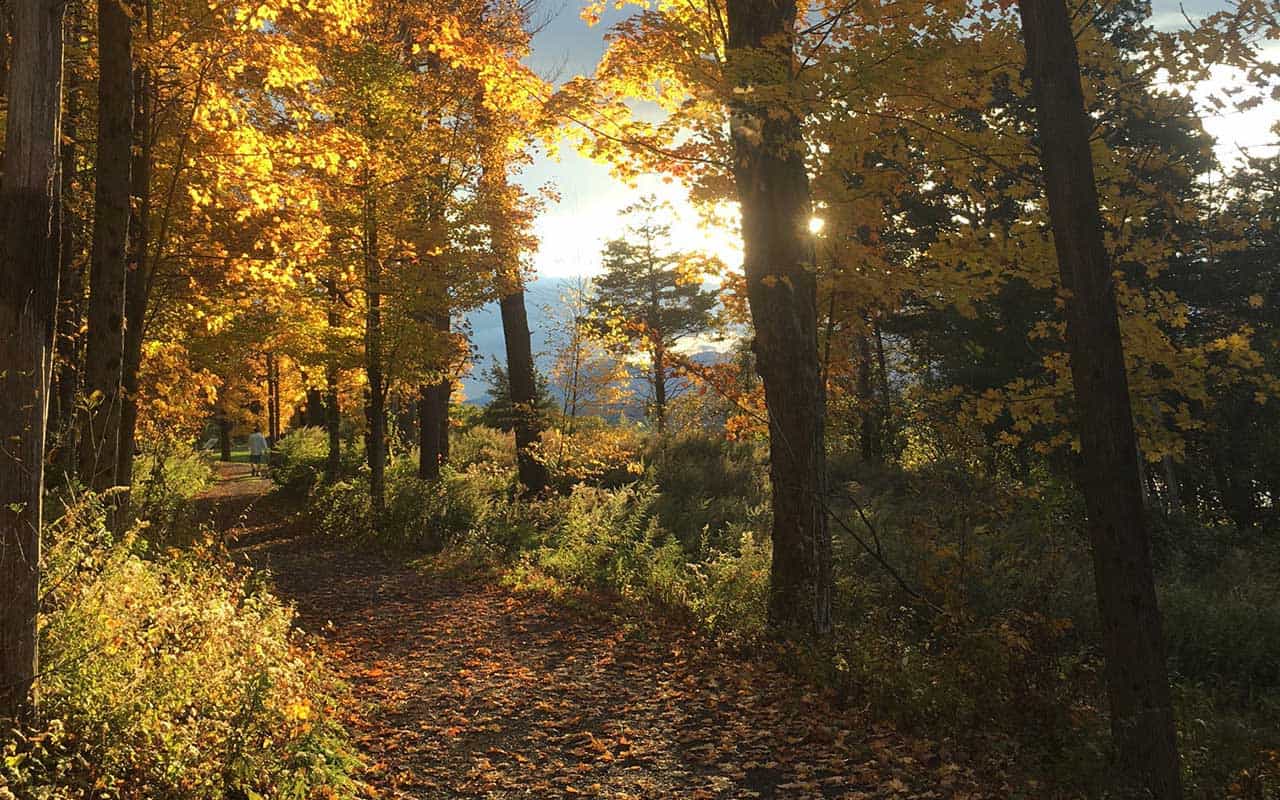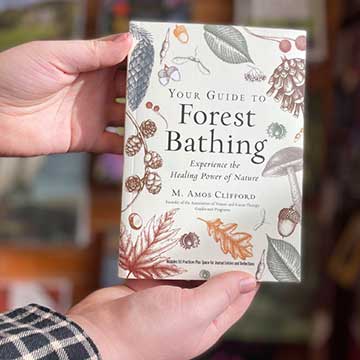This Month’s Featured Article

Immersed In Nature
 Within the last few decades, technology has certainly kept the pace buzzing. While access to a wealth of information on our phones certainly has its advantages, we’re also continually distracted and interrupted by the constant flow of emails, texts, and phone calls. During our leisure time, we often scroll through Instagram or check Facebook or Twitter rather than enjoy the reality of the world around us. While we scroll our devices, we’re missing out on connecting with those around us or just taking in the beauty of what surrounds us.
Within the last few decades, technology has certainly kept the pace buzzing. While access to a wealth of information on our phones certainly has its advantages, we’re also continually distracted and interrupted by the constant flow of emails, texts, and phone calls. During our leisure time, we often scroll through Instagram or check Facebook or Twitter rather than enjoy the reality of the world around us. While we scroll our devices, we’re missing out on connecting with those around us or just taking in the beauty of what surrounds us.
Many people yearn to hit the pause button, so they can take a much-needed time out from this frenetic pace. This is evident in the increasing number of Americans who are practicing yoga and meditation. Many are also taking to the trails for some quality time immersed in nature.
Forest bathing
In recent years, people worldwide have embraced forest bathing, which originally hails from Japan and is referred to as Shinrin-Yoku. The practice encourages people to simply spend time in nature – no actual bathing is required. Also known as nature therapy and ecotherapy, forest bathing describes a broad group of techniques or treatments that harness the serenity of nature to boost mental or physical health.
Brooke Mellen, founder of Cultured Forest – a nature-based mindfulness business in New York City, sheds some light on this practice:
“Shinrin-Yoku is a wellbeing practice that translates to ‘Taking in the forest atmosphere or forest bathing,’” says Mellen. The term, which dates back to 1982, was coined by the Japanese Ministry of Agriculture, Forestry, and Fisheries.
Mellen explains that forest bathing was developed in response to a public health crisis, which involved high burnout rates in Japan’s densely populated cities such as Tokyo. As a result, the Japanese government invested millions of dollars in investigating the health benefits that emerge from spending some time in nature.
Mellen, who has led walks in the Hudson Valley region, first became engaged with forest bathing when she came across a book on the topic while she was browsing a shop on Manhattan’s Lower East Side.
Inspired, she decided to venture to Japan to train and explore the forests and trails there. “While training I met people from other countries who were starting their own practices, so I then travelled to Finland, Australia, and the Netherlands to further study the programing,” says Mellen.
The outdoors enthusiast also explored forest bathing as a means of helping to cope with love and personal life stress of living in the city and the burnout that resulted from that. “I found it to be effective. I’ve developed my own nature mindfulness practice to help me live in the moment while walking in nature. Since starting this practice to help myself and others find a bit of calm and peace in nature, I’ve since taken people on forest therapy walks throughout the world, developed a forest therapy and nature mindfulness coaching program, and provide virtual nature connection workshops,” she adds.
There are now 62 dedicated Shinrin-Yoku locations across Japan. Practitioners meet with medical professionals to test their heart rate, pulse, cortisol, and mood.
Of course, the last few years have ushered in an entirely new set of challenges when the COVID-19 pandemic arrived. “During the pandemic, Harvard Medical and Cleveland Clinic both featured articles about forest therapy, so it is now gaining more traction in the medical community,” concludes Mellen.
In the Hudson Valley, Mellen has practiced in Ferncliff Forest in Rhinebeck; High Falls Conservation Area and Olana State Historic Park, both in Hudson; and beyond.
Health benefits
By conducting studies in forest therapy, Japanese doctors discovered increased killer T cell activity. It can kill certain cells, including foreign cells, cancer cells, and cells infected with a virus. It also improves immunity through mindfulness and exposure to phytoncides – a chemical produced by trees to ward off disease.
Doctors have also witnessed elevated moods and a decrease in heart rate and blood pressure. Other discoveries include lower levels of the stress hormone cortisol and improved concentration. Some say that even a few minutes spent in a natural setting – the beach, forest, or lake, boosts mood, self-esteem, and motivation. Others believe that two full hours in nature weekly, could really elevate health and wellbeing. Interactions with nature can also decrease stress and depression and may help stress management for all age groups. Engaging in this practice can also lead to reductions in stress, anger, anxiety, depression and sleeplessness.
Rhinebeck’s Omega – a non-profit, donor-supported, educational organization at the forefront of holistic studies, addressed this nature-based practice way back in 2014. Since 1977, more than one million people have visited Omega to spark creativity, explore spirituality, improve wellbeing, and connect to a community of lifelong learners.
Omega’s website referenced a June, 2019 study that stated “a growing body of epidemiological evidence indicates that greater exposure to, or ‘contact with’ natural environments (such as parks, woodlands, and beaches) is associated with better health and wellbeing, at least among populations in high income, largely urbanized societies,” according to the study’s authors. The study appeared in Nature Briefing.
Hudson Valley practices
Luckily, the Hudson Valley is brimming with serene destinations that are ideal for forest bathing. There are also a few local practices, including Hudson Valley Forest Bathing and Hudson Valley Forest Therapy. The latter offers forest bathing and hiking activities through Meetups in the Hudson Valley.
Hudson Valley Forest Bathing helps people experience nature’s embrace as they develop their own paths to peace and tranquility. Walks are led by Debi Young – an outdoors enthusiast who enjoys sharing her life-long love of nature with others. She happily guides guests through this peaceful woodland journey.
An avid hiker, Young started hiking and camping when she was just a child. She has been practicing yoga for many years and is trained in mindfulness meditation. Young is also a black belt in Goju Karate – a Japanese martial art that hails from the Okinawan peninsula. In addition, Young has hiked the Appalachian Trail – all the way from Georgia to Maine.
In the Hudson Valley, there’s also Hudson Valley Forest Therapy, which eagerly meets people’s need for self-care. It organizes sessions from New York City to the mid-Hudson Valley region. Services include forest therapy, walks and hikes, transformational coaching, meditation primers, and retreats.
These sessions are led by John Polemis who packed up and relocated from the Bronx to the scenic Hudson Valley. He was lured by the many trails and mysteries that the region has to offer. With nearly 20 years in information technology management experience, in the fast-paced news industry, Polemis has long relied on forest therapy and hiking to build his resilience to the stresses that come with this type of work.
Polemis is also the founder of You Are Why You Create, which is dedicated to building a supportive community for those seeking to further their personal growth by facilitating support groups and providing transformational coaching services. As a coach, Polemis works with people who are struggling to make needed changes by helping them bring focus and set practical goals. He believes that, as a society, we’ve become habituated to distraction and information overload. In so doing, we’ve become stressed out and uncomfortable with silence and stillness, all of which takes its toll on our health.
Polemis’s business offers both the traditional (short walk) forest therapy experience and a longer experience which includes incorporating hiking. Besides its public group walks, those wishing for a more intimate experience can book private sessions that cater to their needs. Corporate accounts are also welcome. The public group walks are generally limited to ten to 15 people, depending on the location of the walk. All participants are entitled to a free 30-minute coaching session via phone.
Book nook
Before you venture out to the forest, you may want to browse a book on the topic. Oblong Books, which has locations in both Millerton and Rhinebeck, offers Your Guide to Forest Bathing – Expanded Edition. The shop also recommends, Forest Bathing: How Trees Can Help You Find Health and Happiness, Forest Bathing: The Rejuvenating Practice of Shinrin Yoku, and Forest Bathing Retreat: Find Wholeness in the Company of Trees. Rough Draft in Kingston both recommends and sells Forest Bathing, by Qing Li. •
If you’re interested in learning more, here are a few sources:
• Hudson Valley Forest Bathing, hv-fb.com
• Hudson Valley Forest Therapy, hudsonvalleyforesttherapy.com
• Oblong Books: 26 Main Street, Millerton, NY, call (518) 789-3797, or visit them in Rhinebeck at 6422 Montgomery Street, call (845) 876-0500, or visit them online at oblongbooks.com.
• Join Brooke Mellen’s email list at cultureforest.com for announcements on upcoming walks.


